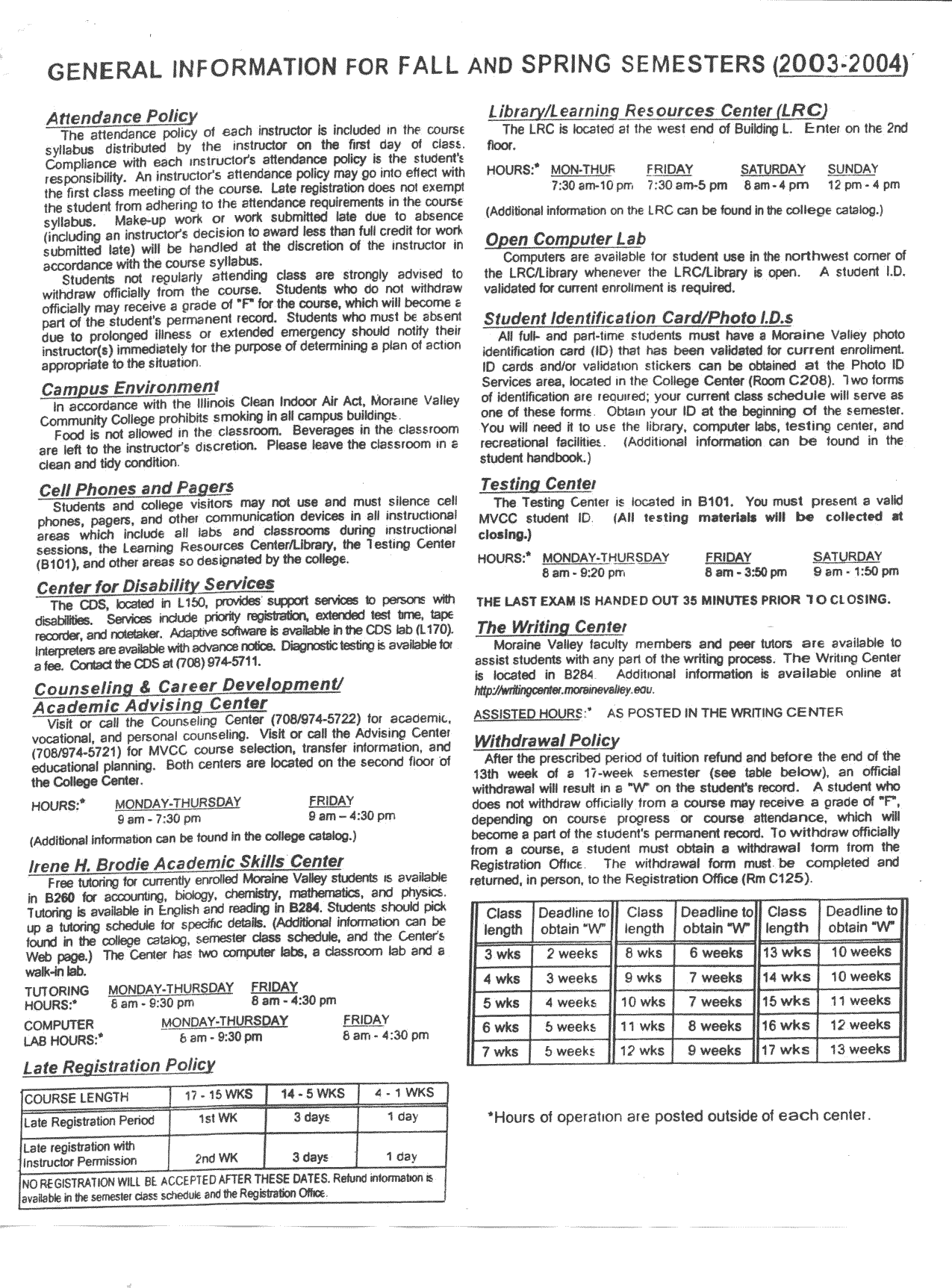

SYLLABUS
Date: 1/04
Course Title: Western Humanities I: Foundations
Course Number: HUM-101-003
Semester: Spring 2004
I. Faculty Information:
A. Instructor: Dr. Al Campbell
B. Office Location:
D. Mailbox Location:
E. Phone: 708.974.5464
F. E-mail: campbelle27@morainevalley.edu
campbell@wolverton-mountain.com
G. Web Site: www.wolverton-mountain.com (see for PowerPoint Presentations)
II. Course Identification:
A. Credit Hours: 3 Semester Hours
B. Total Contact Hours: 3 Lecture: 3 Lab: 0
C. Days and Hours Course Meets: Tuesdays and Thursdays 8:-9:15am
D. Prerequisite: None
E. Corequisite: None
F. Catalog Description: This introductory course surveys artistic and intellectual expression from Classical Greece and Rome, the High Middle Ages, and the High Renaissance. It will explore works, figures, ideas, movements, and styles in literature, philosophy, and the visual and performing arts that are significant to, representative of, and foundational to Western culture. Illinois Articulation Initiative (IAI) Number: HF 90
III. Textbook:
A. Required: The Humanistic Tradition, Vol. I, 4th Edition, by Gloria K. Fiero
IV. Program/Course Goals or Major Purposes:
A. Basic historical background, chronological relationships, and cultural aspects of the intellectual and artistic expressions of Classical Greece and Rome, the High Middle Ages, and the High Renaissance.
B. Ideas, values, characteristics, archetypes, subject matter, motifs, and styles that are significant to, representative of, and foundational to these epochs.
C. Significant, representative, and foundational works of literature, philosophy, and the visual and performing arts, as well as their creators from these epochs.
D. Formal elements, mediums, and techniques of the literary, visual, and performing arts appropriate to these epochs.
E. Nature of aesthetics, aesthetic stimuli, and aesthetic response.
V. Course End Competencies:
Students will be able to:
A. Demonstrate a familiarity with the main artistic styles and intellectual movements in Western culture between 25,000 B.C.E. and 1600 C.E., their general characteristics, the chronological order in which they occur, and the geographic areas of their production.
B. Demonstrate a knowledge of the basic aesthetics/expressive qualities, ideas, motifs, characteristics, and values of these cultural expressions and relate them to the context of Western Culture in general.
C. Recognize works of literature, philosophy, and the visual and performing arts that are significant to, representative of, and foundational to Western culture between 25,000 B.C.E. and 1600 C.E., as well as demonstrate a basic knowledge of such works and their creators.
D. Demonstrate an understanding of basic forms, mediums, elements, techniques, and terminology of the literary, visual, and performing arts.
E. Demonstrate sharpened perceptions and an increased awareness and sensitivity towards aesthetic stimuli/experiences.
VI. Classroom Policies/Procedures:
A. General Information Sheet: (attached)
B. Withdrawal: A student who does not withdraw officially from a course may receive a grade of “F,” depending on course progress or course attendance, which will become a part of the student’s permanent record. The official withdrawal date is listed in the General Information Sheet.
C. Final Exam Schedule: see attached
D. Attendance Policy: Students are expected to attend regularly for the full class period. In accordance with this expectation, each student will receive an attendance grade proportionate to the number of classes missed.
E. Cheating/Plagiarism Policy: Any student found cheating or plagiarizing at anytime during the course will receive an “F” for the course.
F. Late Assignments: Late assignments will lose one grade level for each scheduled class period beyond the due date.
G. Conduct: Each student is responsible for adhering to the Code of Student Conduct as stated in the college catalog.
H. Testing Center Requirements: Exams and quizzes must be made up in the testing center (B101) prior to the following scheduled class period. A Moraine Valley Student I.D. is required for the use of the testing center. All exams for this course can be found under the identification number 579.
I. Communication Devices: Faculty, staff, students and college visitors may not use and must silence cell phones, pagers, and other communication devices in all instructional areas which include: all labs and classrooms during instructional sessions, the Learning Resources Center/Library, the Assessment Services Center, and other areas so designated by the college.
VII. Evaluation Criteria:
A. Quiz/Class Participation, Midterm, Term Paper, and Final Exam—each weighted at 25% of Final Grade. The final exam will be a two-hour comprehensive examination consisting of objective questions on material from the entire course. A portion of this final exam consists of questions supplied by the Humanities Department.
B. Your term paper will be a 12-page research project exploring the life of an artist of your choice and what that artist added to the world of creativity. In addition to understanding what made the artist famous, you will delve into the motivating forces that produced that artistic expression. This is a critical aspect of your project.
VIII. Course Schedule:
Week Date Topic Assignment
1........... 1/20-1/22............................. Introduction................................................... p. 1-16
2........... 1/27-1/29............................. Egypt............................................................. p. 17-35
4........... 2/10-2/12............................. Greece .......................................................... p. 67-106
5........... 2/17-2/19............................. Classical Style.............................................. p. 107-130
6........... 2/24-2/26............................. Rome............................................................. p. 131-159
8........... 3/09-3/11............................. Language of Faith/Midterm...................... p. 191-210
3/13-21 No classes—Spring Break
9........... 3/23-3/25............................. Islamic World…............................................ p. 219-239
10......... 3/30-4/01 ............................ Patterns of Medieval Life ........................... p. 240-267
11......... 4/06-4/08............................. Christianity and the Medieval Mind .......... p. 268-290
13......... 4/20-4/22............................. Adversity and Challenge ............................. p. 349-372
14......... 4/27-4/29............................. Classical Humanism .................................... p. 373-393
15......... 5/04-5/06............................. Renaissance Artists..................................... p. 394-433
16......... 5/11-5/13............................. Term Paper Protest and Reform........ p. 473-502
17.... 5/18 8:-9:50am....................... Final Exam Week (schedule attached)
Items on the syllabus may be added, deleted, or modified throughout the semester. Students will be apprised of any changes.

